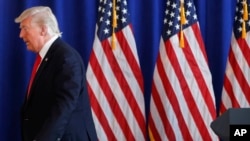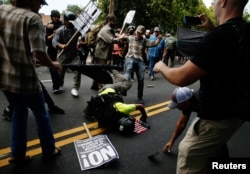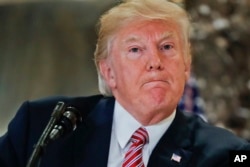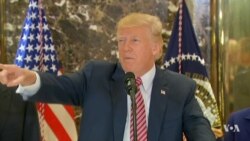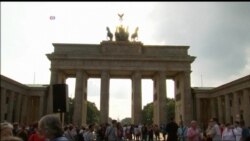U.S. President Donald Trump continues to face a barrage of criticism for his contention that both white supremacists and counterprotesters were to blame for the deadly violence that erupted last weekend in Charlottesville, Virginia.
On Wednesday, the president announced that he had dissolved two business advisory committees composed of top American corporate executives, after at least seven CEOs announced they were resigning from the councils because of his remarks.
Trump said that “rather than putting pressure on the businesspeople ... I am ending both. Thank you all!” A day ago, Trump had branded those quitting the panels as “grandstanders” and said they could be easily replaced with more corporate leaders.
In announcing her resignation from Trump’s manufacturing jobs initiative before he disbanded it, Campbell’s Soup CEO Denise Morrison said: “Racism and murder are unequivocally reprehensible and are not morally equivalent to anything else that happened in Charlottesville. I believe the president should have been — and still needs to be — unambiguous on that point.”
Former GOP presidents
U.S. Secretary of State Rex Tillerson told reporters in Washington, D.C., that he condemns the “hate and violence” displayed on Saturday in Charlottesville, adding, “There is just simply no place for that in our public discourse.”
U.S. Attorney General Jeff Sessions, speaking at an event in Miami, Florida, said, “In no way can we accept [or] apologize for racism, bigotry, hatred, violence, and those kind of things that too often arise in our country.”
Also Wednesday, two former U.S. presidents, George H.W. Bush and his son George W. Bush, the last two Republicans elected to the White House before Trump, said in a joint statement, “America must always reject racial bigotry, anti-Semitism, and hatred in all forms.”
The two former presidents added, “As we pray for Charlottesville, we are reminded of the fundamental truths recorded by that city’s most prominent citizen in the Declaration of Independence: we are all created equal and endowed by our Creator with unalienable rights,” a reference to Thomas Jefferson, one of the country’s Founding Fathers. “We know these truths to be everlasting because we have seen the decency and greatness of our country.”
President Trump’s remarks have been roundly criticized by a broad range of U.S. leaders, including top Republican party officials and business executives. U.S. military commanders spoke out against racism following the death in Charlottesville.
Not welcome in Phoenix
Trump announced Wednesday he will hold a campaign rally next week in Phoenix, Arizona, but the city’s mayor said that while the president has the right to stage the event, he hopes Trump will delay the visit.
“I am disappointed that President Trump has chosen to hold a campaign rally as our nation is still healing from the tragic events in Charlottesville,” Mayor Greg Stanton said. “If President Trump is coming to Phoenix to announce a pardon for former Sheriff Joe Arpaio, then it will be clear that his true intent is to enflame emotions and further divide our nation.”
Arpaio was convicted last month in a federal court for disobeying a judge’s order to stop traffic patrols that targeted immigrants. Trump said in an interview this week he was considering pardoning Arpaio, who was one of the speakers at last year’s Republican National Convention where the now-president accepted the party’s nomination for the November election.
'Many sides' to blame
As the violence unfolded last Saturday, Trump initially blamed it on “many sides.” By Monday, he condemned the neo-Nazis, white supremacists and the racist Ku Klux Klan for their role in the unrest.
But at a news conference Tuesday, Trump reverted to his initial assessment of the violence that killed one woman and wounded 19 others when a Nazi sympathizer drove a car into a crowd of counterprotesters.
“I think there’s blame on both sides,” Trump said. “And I have no doubt about it.” He said there were “fine people” among the white nationalists and counterprotesters at the rally 160 kilometers southwest of Washington.
David Duke, the one-time Imperial Wizard of the Ku Klux Klan, immediately praised Trump’s remarks, saying, “Thank you President Trump for your honesty & courage to tell the truth about Charlottesville & condemn the leftist terrorists.”
Watch: Republicans Join Democrats in Denouncing Trump Comments on Charlottesville
U.S., global reaction
Key Republicans took immediate offense at Trump’s contention there was equivalency in who was to blame for the hours of street violence, as demonstrators squared off with makeshift clubs, engaged in fistfights and fired bursts of chemical irritants at each other.
“We must be clear. White supremacy is repulsive,” said House Speaker Paul Ryan. “This bigotry is counter to all this country stands for. There can be no moral ambiguity.”
Senator Marco Rubio, defeated last year by Trump for the Republican presidential nomination, said, “Mr. President, you can’t allow #WhiteSupremacists to share only part of blame.”
Ohio Governor John Kasich, who also lost to Trump in 2016, said, “The president of the United States needs to condemn these kind of hate groups. This is about the fact that now these folks are apparently going to go other places and they think that they had some sort of a victory.”
Senate Democratic leader Senator Charles Schumer said, “When David Duke and white supremacists cheer your remarks, you’re doing it very, very wrong. Great and good American presidents seek to unite, not divide. Donald Trump’s remarks clearly show he is not one of them.”
Watch: Charlottesville's Far-right Rally Evokes Europe's Dark Past
Trump’s remarks also drew a rebuke from an ally, British Prime Minister Theresa May.
May said, “I see no equivalence between those who propound fascist views and those who oppose them. I think it is important for all those in positions of responsibility to condemn far-right views wherever we hear them.”




